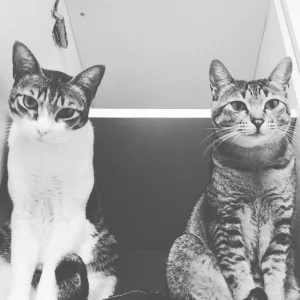
Since childhood, I have shared my life with animals, each one holding a special place in my heart and memories. They have consistently brought enrichment, comfort, unconditional love, and sheer joy into my life. Among them, the two cats depicted in the photo are Bailey, positioned on the left, and Bella, on the right, both rescues from Hong Kong. Every day, they seamlessly integrate into my routines, becoming integral parts of my family unit.
Over the past 18 months, I've experienced the loss of two other cherished members of our family, Mika and Poppy. Making the difficult decisions regarding their well-being was an agonizing process, and the resulting pain and guilt have weighed heavily on me. During such a loss, one can't help but be inundated with questions and a flood of emotions.
During the final year of my studies, as I considered a topic for my dissertation, I found myself drawn back to the emotions I experienced when I lost Mika and Poppy. The decisions and choices I had to confront were anything but easy. Much of the time, I found myself grappling with anticipatory grief, knowing I was soon to lose them, and then experiencing the profound solitude of their absence. If only I had someone to confide in, someone who could empathize and assist me in processing it all.
I soon realized that finding a counsellor specializing in pet loss support was more challenging than anticipated. However, through my literature review, I discerned the significant need for such services. Studies indicate that individuals often endure grief for a prolonged period, exceeding societal expectations. The profound impact of this loss reverberates widely, with many individuals concealing their grief due to fears of inadequate recognition and acceptance. Moreover, my research and conversations with grieving individuals revealed a crucial requirement for reassurance when seeking counselling—a need for therapists with a firsthand understanding of pet loss.
